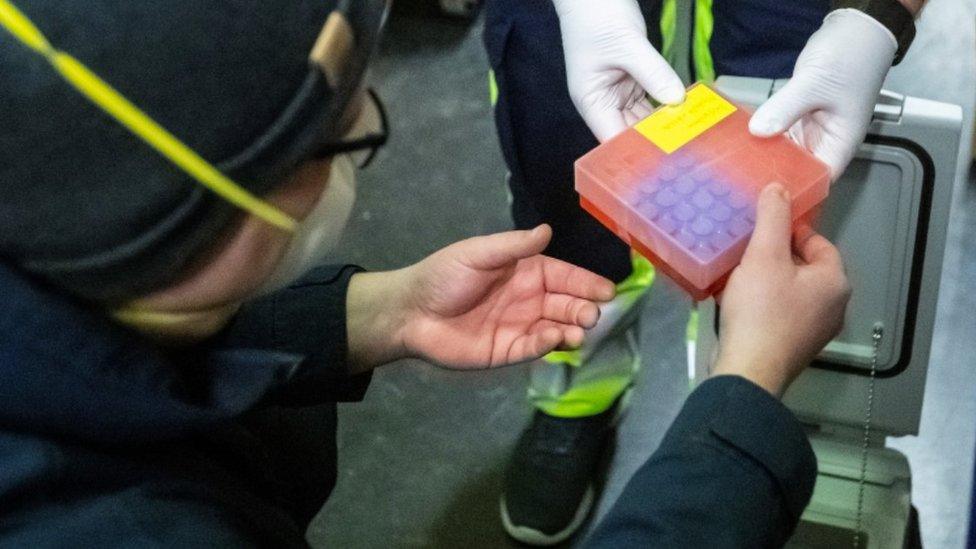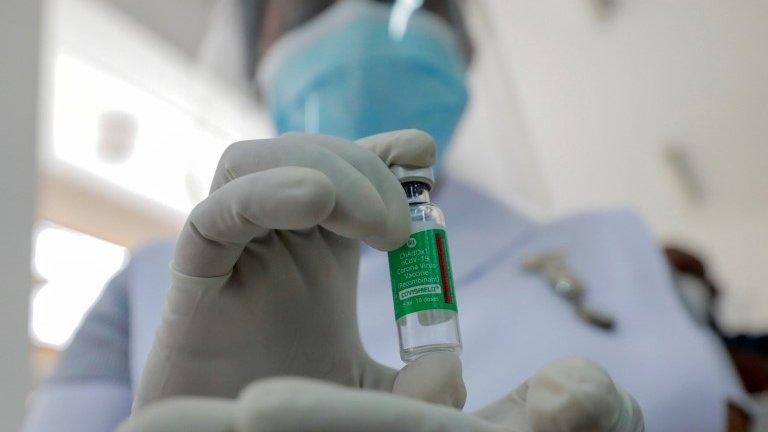Brexit: EU introduces controls on vaccines to NI
- Published
Arlene Foster: EU Covid vaccine controls are an "act of aggression"
The EU is introducing controls on vaccines made in the bloc, including to Northern Ireland, amid a row about delivery shortfalls.
Under the Brexit deal, all products should be exported from the EU to Northern Ireland without checks.
But the EU believed this could be used to circumvent export controls, with NI becoming a backdoor to the wider UK.
Prime Minister Boris Johnson called for the EU to "urgently clarify its intentions".
NI First Minister Arlene Foster described the move as "an incredible act of hostility" by the EU.
The EU invoked Article 16 of the Northern Ireland Protocol which allows parts of the deal to be unilaterally overridden.
In a new regulation, the European Commission stated: "This is justified as a safeguard measure pursuant to Article 16 of that Protocol in order to avert serious societal difficulties due to a lack of supply threatening to disturb the orderly implementation of the vaccination campaigns in the Member States."
The move comes amid a dispute over vaccine producer AstraZeneca's delivery commitments to the EU.
The bloc agreed to buy up to 400m doses of the AstraZeneca vaccine last year, and on Friday the EU's drugs regulator approved their use for all adults.
But the firm said that due to problems at one of its EU factories, supplies would be reduced by about 60% in the first quarter of 2021.
A Downing Street spokesperson said: "The UK government is urgently seeking an explanation from the European Commission about the statements issued by the EU today and assurances as to its intentions.
"The UK has legally-binding agreements with vaccine suppliers and it would not expect the EU, as a friend and ally, to do anything to disrupt the fulfilment of these contracts.
"The UK government has reiterated the importance of preserving the benefits of the Belfast/Good Friday agreement and the commitments that have been made to the two communities."

The EU is under growing pressure over the slow pace of vaccine distribution
The prime minister spoke with Taoiseach (prime minister) Micheal Martin on Friday night and stressed the need for the EU to clarify its intentions.
An Irish government spokesman said Mr Martin was currently in discussions with European Commission President Ursula Von Der Leyen to express Dublin's concerns.
'Aggressive and shameful'
The Northern Ireland Protocol is a special deal to prevent the re-emergence of a hard border between Northern Ireland and the Republic of Ireland.
Article 16 of the Northern Ireland Protocol, agreed in the original withdrawal agreement, is essentially a safeguard that would allow the UK or EU to act unilaterally if measures imposed as a result of the protocol are deemed to be causing "serious economic, societal or environmental difficulties".
Unionist politicians in Northern Ireland have been agitating for the UK government to use Article 16 to reduce checks on goods entering Northern Ireland from the rest of the UK.
The government has been resisting this, insisting the new arrangements are not creating serious difficulties.


The EU's actions are seen as an audacious move. Unionist politicians are incredulous.
Throughout the Brexit process the EU vehemently insisted there could be no border on the island of Ireland. For a while the entire trade deal hinged on this.
But now, to critics, it appears that principle has vanished over vaccines.
It begs the question, if the EU can decide to push this button on this, what else might they use it for in future?
Those who strongly oppose the Brexit arrangements in Northern Ireland will be pushing even harder now for the UK to use Article 16 to override parts of the deal for its own purposes, too.

The EU's move should not directly disadvantage Northern Ireland, which gets its vaccine supplies through the UK procurement system.
"The government has contracts with AstraZeneca & others to ensure vaccines are delivered on schedule & guarantee reliable vaccine provision across the whole of the UK," tweeted Northern Ireland Secretary Brandon Lewis.
Politicians who support the Northern Ireland Protocol have reacted with dismay, fearing the EU move could undermine the whole deal.
Louise Haigh MP, Labour's Shadow Northern Ireland Secretary, said the move was "deeply destabilising and undermines the huge efforts being made to make the Protocol work".
For her part, DUP leader Arlene Foster said the EU had placed a "hard border" between Northern Ireland and the Republic of Ireland.
"By triggering Article 16 in this manner, the European Union has once again shown it is prepared to use Northern Ireland when it suits their interests but in the most despicable manner - over the provision of a vaccine which is designed to save lives," she said.
"At the first opportunity the EU has placed a hard border between Northern Ireland and the Republic of Ireland over the supply chain of the coronavirus vaccine.
"With the European Union using Article 16 in such an aggressive and most shameful way, it is now time for our Government to step up."


Article 16 of the Northern Ireland Protocol is a safeguard mechanism. Similar measures are often found in a variety of trade agreements.
It allows either the UK or the EU to take unilateral action if the application of the protocol leads to serious 'economic, societal or environmental difficulties' which are liable to persist.
It doesn't define what 'serious' means, but Article 16 is only meant to be used in an emergency. So, the fact that the EU has chosen to invoke it shows just how seriously it is taking its vaccine shortages.
But how will the UK respond? If Northern Ireland could become a backdoor for vaccines to be taken from the EU into the UK, couldn't the same point be argued the other way round?
Arlene Foster clearly expects something to be done.
"I will be urging the Prime Minister to act," she says, "and use robust measures including Article 16 to advance the interests of Northern Ireland and the rest of the United Kingdom."
The intriguing thing is that Article 16 doesn't, of course, apply only to vaccines.
There have been plenty of people calling on the government to invoke Article 16 to help alleviate the trade problems that have arisen between Great Britain and Northern Ireland since the beginning of the year.
That's because Great Britain is now outside the EU single market, but Northern Ireland is still following many single market rules.
This latest development means the plot thickens even further.

Sinn Fein leader Mary Lou McDonald described the EU's use of Article 16 as a "grave error".
"Our citizens need timely access to lifesaving vaccines not trade disputes," she tweeted. "Now is a time for cool heads and solidarity."
Ulster Unionist Party leader Steve Aiken said the UK government should now invoke Article 16 in response to the EU's actions.
Alliance Party leader Naomi Long said what was needed was "maximum co-operation", rather than "obstructive behaviour" from the EU.
SDLP leader Colum Eastwood said the European Commission's decision to invoke Article 16 was "disproportionate".
What is the supply row about?
Last week AstraZeneca said vaccine supplies would be reduced because of problems in one of its EU factories.
The shortfall is expected to be about 60% in the first quarter of 2021. The EU has also received fewer than expected doses of the two other vaccines it has approved - from Pfizer-BioNTech and Moderna.
The EU has said AstraZeneca must honour its commitments and deliver the jabs it ordered by diverting doses manufactured in the UK. The company said its contract for UK supplies prohibits that, since it must fulfil Britain's order before it can send supplies made there abroad.
But an EU source familiar with the matter told the BBC that AstraZeneca's UK facilities were legally obliged to do so, saying: "This is not an option, it is a contractual obligation."
The UK plants are not back-up facilities; they are part of the main network, the source added.
The company's CEO Mr Soriot said earlier this week that the contract obliged AstraZeneca to make its "best effort" to meet EU demand, without compelling it to stick to a specific timetable - an assertion disputed by the EU.
"There are binding orders and the contract is crystal clear," European Commission chief Ursula von der Leyen said in an interview with German radio on Friday morning.
"'Best effort' was valid while it was still unclear whether they could develop a vaccine. That time is behind us. The vaccine is there."
Related topics
- Published2 February 2024

- Published29 January 2021
